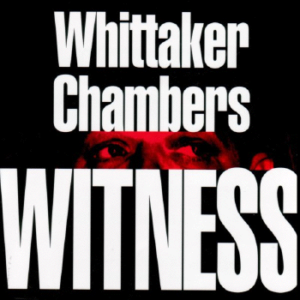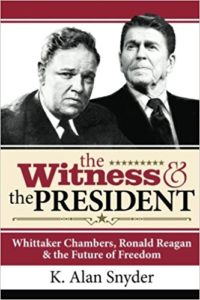 The most fascinating autobiography of the 20th century was Whittaker Chambers’s Witness. I’ve re-read it numerous times, particularly in tandem with the course I teach on him and his writings.
The most fascinating autobiography of the 20th century was Whittaker Chambers’s Witness. I’ve re-read it numerous times, particularly in tandem with the course I teach on him and his writings.
Why did Chambers decide to call his book Witness? His testimony before HUAC was an accounting of what he knew about the underground—but that is all a testimony is. It tells what happened; it provides facts. Chambers saw what he was doing as something more, something deeper. A witness is someone who goes beyond simply providing testimony. He describes it in this way:
A witness, in the sense that I am using the word, is a man whose life and faith are so completely one that when the challenge comes to step out and testify for his faith, he does so, disregarding all risks, accepting all consequences.
With his mouth, a man testifies; with his life, he makes a witness.
The opening section of Witness was slightly unorthodox, but that kind of thing could be expected from Chambers. He chose to begin with his own foreword that he called “A Letter to My Children.” Family was the highest priority for him. That was why he bought Pipe Creek Farm. It was why he sought to shield his children from everything connected to his past for as long as possible. The Hiss Case changed that; now he wanted to leave them a personal witness as a prelude to the rest of the book.
 His Time associate Craig Thompson had seen him the day after his first testimony before HUAC. “‘Boy,’ I said, ‘you’ve sure dropped an A-bomb this time.’ For once he couldn’t even grin. ‘Yes,’ he said heavily, ‘And now I’m going home to see what my children think of me.'” His “Letter” was intended as a guidepost for them:
His Time associate Craig Thompson had seen him the day after his first testimony before HUAC. “‘Boy,’ I said, ‘you’ve sure dropped an A-bomb this time.’ For once he couldn’t even grin. ‘Yes,’ he said heavily, ‘And now I’m going home to see what my children think of me.'” His “Letter” was intended as a guidepost for them:
My children, as long as you live, the shadow of the Hiss Case will brush you. In every pair of eyes that rests on you, you will see pass, like a cloud passing behind a woods in winter, the memory of your father—dissembled in friendly eyes, lurking in unfriendly eyes.
Sometimes you will wonder which is harder to bear: friendly forgiveness or forthright hate. In time, therefore, when the sum of your experience of life gives you authority, you will ask yourselves the question: What was my father?
I will give you an answer: I was a witness.
The foreword is powerful as a concise essay on what to expect in the rest of the book: the two irreconcilable faiths; the commitment of the communists to their cause; the communist vision of man without God; the proper way to break with communism; the need for the West to renew its faith in God or be destroyed.
“There has never been a society or a nation without God,” Chambers instructed. “But history is cluttered with the wreckage of nations that became indifferent to God and died.” The “Letter” ends with a highly personal passage:
My children, when you were little, we used sometimes to go for walks in our pine woods. In the open fields, you would run along by yourselves. But you used instinctively to give me your hands as we entered those woods, where it was darker, lonelier, and in the stillness our voices sounded loud and frightening.
In this book I am again giving you my hands. I am leading you, not through cool pine woods, but up and up a narrow defile between bare and steep rocks from which in shadow things uncoil and slither away. It will be dark. But, in the end, if I have led you aright, you will make out three crosses, from two of which hang thieves. I will have brought you to Golgotha—the place of skulls.
This is the meaning of the journey. Before you understand, I may not be there, my hands may have slipped from yours. It will not matter. For when you understand what you see, you will no longer be children. You will know that life is pain, that each of us hangs always upon the cross of himself. And when you know that this is true of every man, woman and child on earth, you will be wise.
 I was deeply moved by the elegance of the writing the first time I read Witness. That emotional connection with the book has never left me. It’s why I want to introduce students to it. I want them to grasp—as a generation seemingly removed from the grip of the Cold War and the threat of communism—the eternal truths Chambers enunciates.
I was deeply moved by the elegance of the writing the first time I read Witness. That emotional connection with the book has never left me. It’s why I want to introduce students to it. I want them to grasp—as a generation seemingly removed from the grip of the Cold War and the threat of communism—the eternal truths Chambers enunciates.
Just because the outward expression of the conflict, the Cold War, has ended, that doesn’t mean the conflict is over. It’s never over, precisely because the conflict is not simply between two political or economic systems; rather, it’s the age-old conflict of faith in God vs. faith in man. That one never ends.
I highly recommend reading Chambers’s Witness. You also can get a significant part of it in my book, The Witness and the President: Whittaker Chambers, Ronald Reagan, and the Future of Freedom, from which this excerpt is taken.
